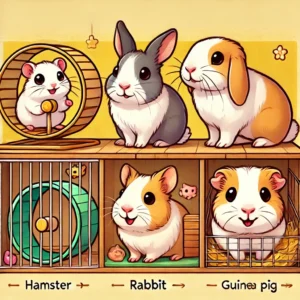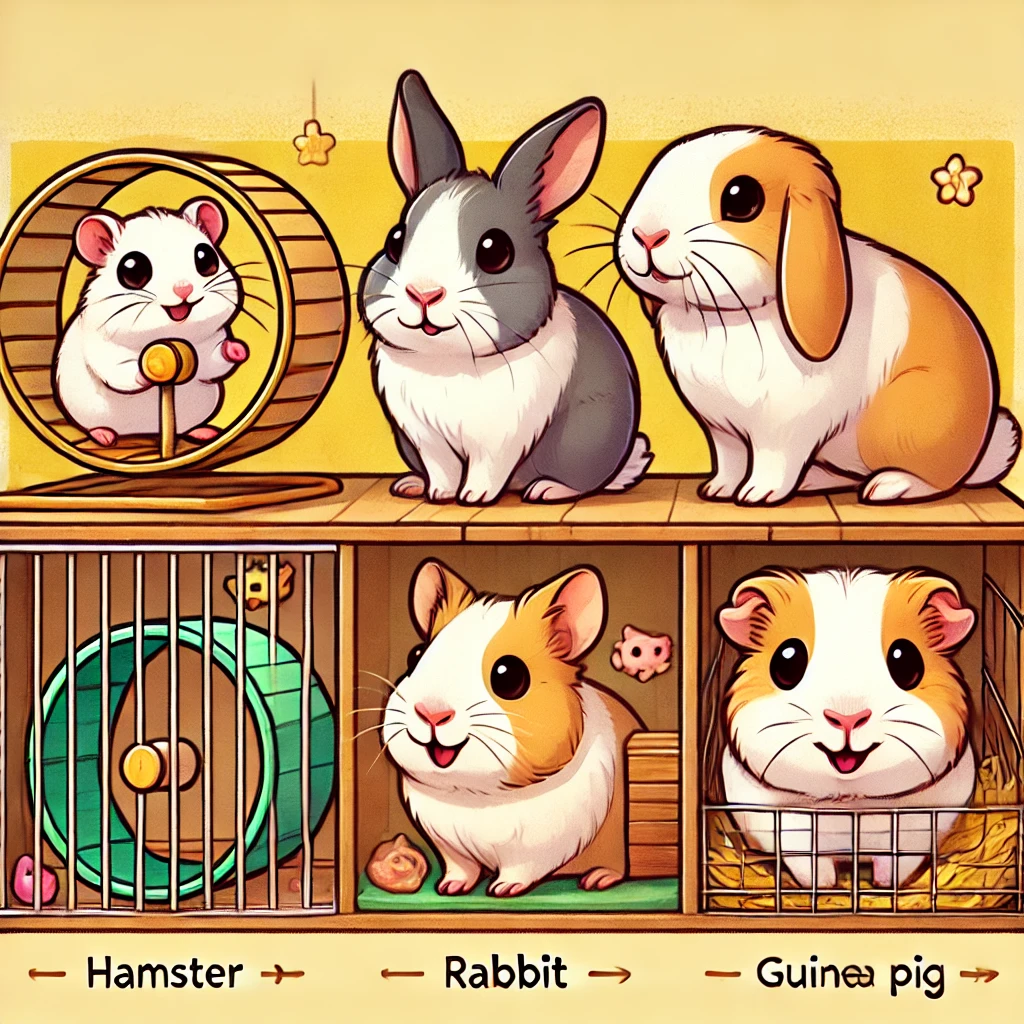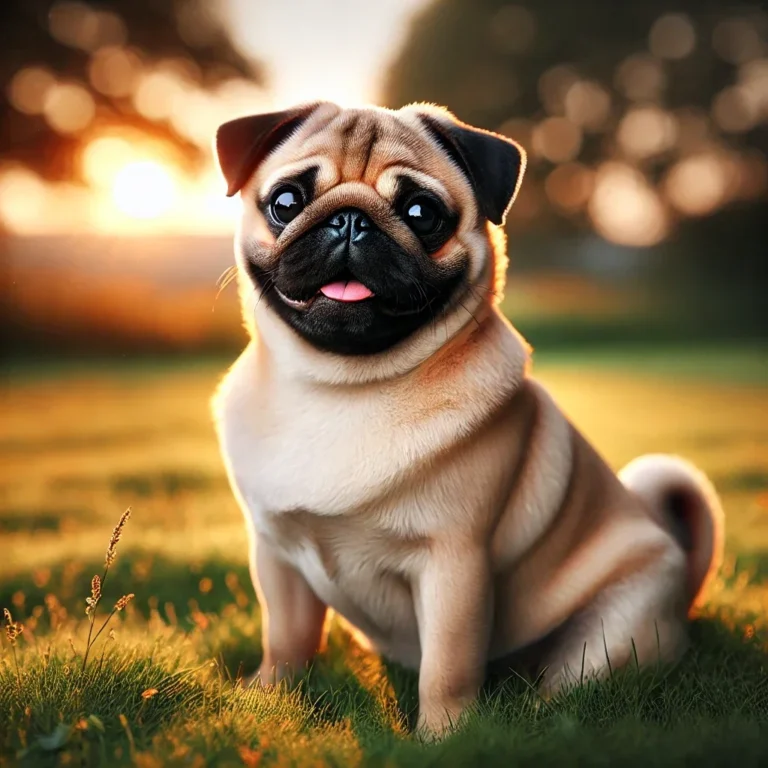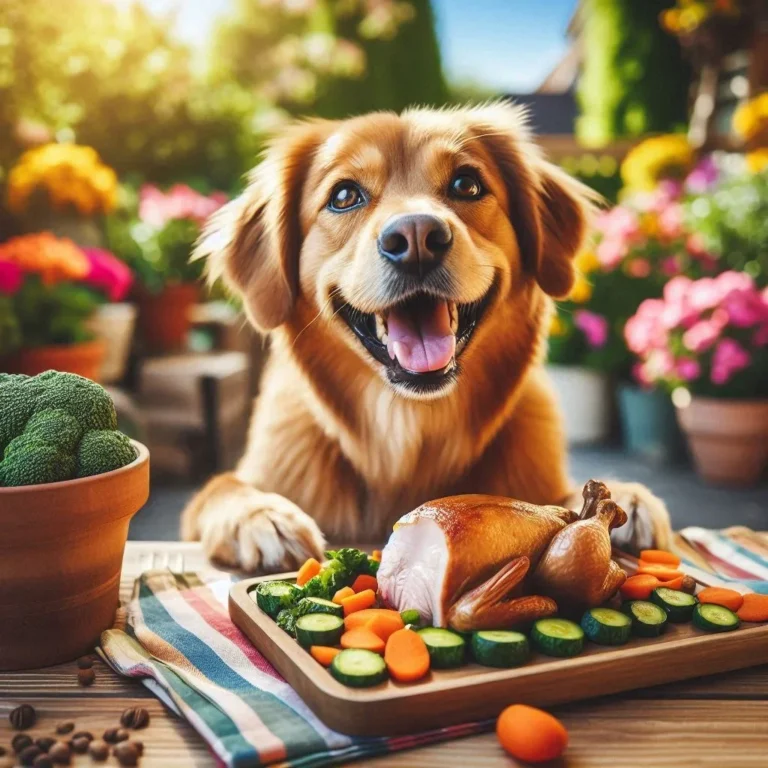Hamsters vs. Rabbits vs. Guinea Pigs: Which Pet is Best for You
Hamsters, Rabbits, and Guinea Pigs

Choosing the right pet can be a challenging decision, especially when considering small animals like hamsters, rabbits, and guinea pigs. Each of these adorable creatures has unique characteristics, care requirements, and suitability depending on lifestyle and personal preferences. This guide will compare these three pets in terms of their temperament, space needs, diet, lifespan, maintenance, and cost to help you make the best choice.
Temperament and Social Needs
- Hamsters: Hamsters are solitary animals and prefer to live alone. They can be active and playful but may not always enjoy excessive handling. Since they are nocturnal, they are most active at night, which might not align with everyone’s schedule.
- Rabbits: Rabbits are highly social animals and thrive in the company of humans or other rabbits. They enjoy interaction and can be affectionate when handled correctly. However, they require time and patience to build trust.
- Guinea Pigs: Guinea pigs are very social and should ideally be kept in pairs or small groups. They are known for their gentle nature and vocalizations, making them excellent companions. They enjoy human interaction and are generally friendly and easy to handle.
Space Requirements
- Hamsters: Hamsters require a spacious cage with tunnels, wheels, and hiding spaces. While they don’t need an entire room, they do require a well-ventilated and escape-proof enclosure.
- Rabbits: Rabbits need a much larger space than hamsters. A rabbit should ideally have a large enclosure or free-roam space inside a house, along with time for supervised outdoor play.
- Guinea Pigs: Guinea pigs also need a sizeable enclosure with room to move and play. Since they are not as agile as hamsters, they require more floor space than height.
Diet and Feeding Needs
- Hamsters: Hamsters eat a mix of commercial hamster pellets, fresh vegetables, fruits, and occasional protein sources like boiled eggs or mealworms.
- Rabbits: A rabbit’s diet consists primarily of hay, fresh vegetables, and pellets. Hay is crucial for their digestive health and helps keep their teeth trimmed.
- Guinea Pigs: Guinea pigs also require hay, along with fresh vegetables, fruits, and vitamin C supplements, as they cannot produce vitamin C on their own.
Lifespan and Long-Term Commitment
- Hamsters: Hamsters have the shortest lifespan, usually around 2-3 years, making them a less long-term commitment.
- Rabbits: Rabbits can live between 8-12 years, so adopting one is a significant responsibility.
- Guinea Pigs: Guinea pigs typically live for 5-7 years, requiring a moderate commitment compared to rabbits and hamsters.
Maintenance and Grooming
- Hamsters: Hamsters are relatively low maintenance. Their cages need regular cleaning, and they require a steady supply of fresh food and water.
- Rabbits: Rabbits need regular grooming, especially long-haired breeds. Their enclosures must be cleaned frequently, and they require plenty of social interaction and playtime.
- Guinea Pigs: Guinea pigs need occasional grooming, particularly long-haired varieties. Their bedding must be changed frequently, and they require daily feeding and social time.
Cost Considerations
- Hamsters: Hamsters are the most budget-friendly option. Their cages, food, and accessories are relatively inexpensive.
- Rabbits: Rabbits require a larger initial investment for their enclosures and ongoing costs for food, toys, and medical care.
- Guinea Pigs: Guinea pigs fall in between in terms of cost. While they require a spacious cage and fresh produce, their maintenance is not as expensive as rabbits.
Which Pet is Best for You?
- Choose a Hamster if: You have limited space, prefer a pet with minimal interaction, and are comfortable with a short-term commitment.
- Choose a Rabbit if: You have enough space and time to dedicate to an affectionate and interactive pet with a long lifespan.
- Choose a Guinea Pig if: You want a social, friendly pet that is easy to handle and requires moderate care.
Ultimately, the best pet depends on your lifestyle, space availability, and level of commitment. Each of these animals has unique qualities that make them wonderful companions in their own way.





